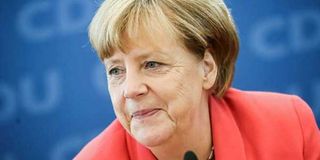Merkel heads to Africa with eye on reducing migration from Africa

German Chancellor Angela Merkel before the start of the Christian Democrats (CDU) party executive meeting in Berlin, Germany, September 19, 2016. The German leader is headed to Mali, Niger and Ethiopia where she will hold talks with leaders of the three countries. PHOTO | AFP/EPA
What you need to know:
- The German Chancellor will travel to Mali, Niger and Ethiopia.
- Her talks with leaders of all three countries are to focus on migration issues and the battle against terrorism.
BERLIN
German Chancellor Angela Merkel embarks Sunday on a visit to three African countries before hosting leaders from Chad and Nigeria for talks in Berlin, as she seeks ways to stem a migrant influx to Europe.
Merkel will first travel to Mali and Niger before heading to Ethiopia where she is to visit the headquarters of the African Union in the capital, Addis Ababa.
Her talks with leaders of all three countries are to focus on migration issues and the battle against terrorism.
On Wednesday, a day after her return to Berlin, she will host Chadian President Idriss Deby. She will cap off the week by meeting with Nigeria's President Muhammadu Buhari to discuss the African giant's battle against Boko Haram Islamists.
"The well-being of Africa is in Germany's interest," Merkel told Die Zeit weekly in an interview ahead of the visit, arguing that bringing more stability to Africa and improving living conditions on the continent would help reduce the numbers of people seeking to leave.
Simply ignoring the reasons that are pushing people to migrate "will not make the problem go away," she warned.
Pointing to drought plaguing Chad as an example, Merkel said that "it does not mean that everyone who is in difficulties there can come to Europe as a refugee".
"But we should be interested in whether 11 million people will have a livelihood or not," she stressed.
The German leader has said that she wants the European Union and North African countries to do deals modelled on a controversial agreement with Turkey to curb migrant flows to Europe.
Under the EU-Turkey agreement, Ankara agreed to take back one Syrian who made it to Greece in return for being allowed to send one from its massive refugee camps to the bloc in a more orderly redistribution programme.
The deal also pledges billions of euros in EU aid for Turkey, visa-free European travel for Turkish citizens and accelerated EU membership talks.





